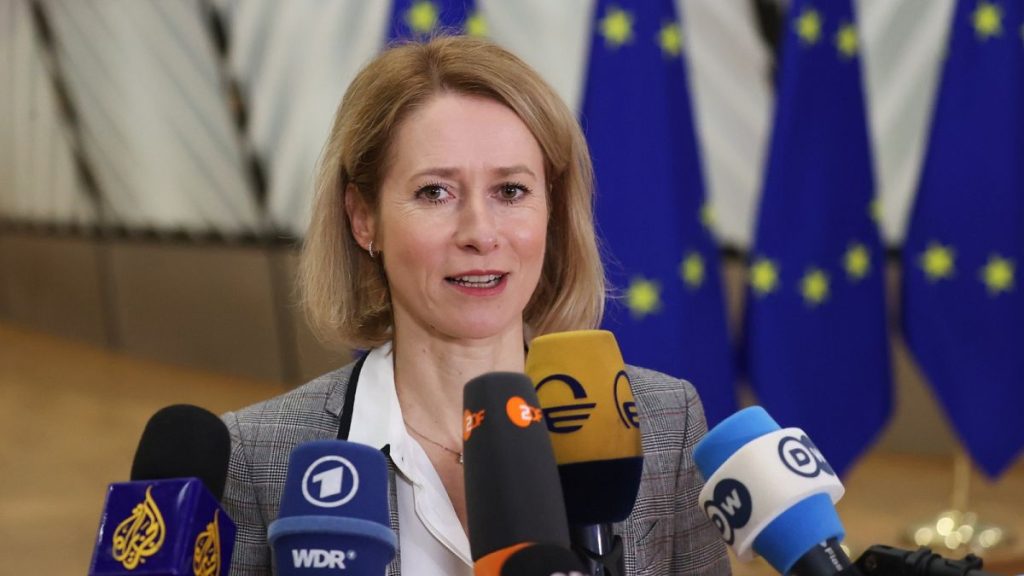The European Union has embarked on a cautious and unprecedented path of engagement with Hayat Tahrir al-Sham (HTS), the rebel group that spearheaded the overthrow of Bashar al-Assad’s regime in Syria. This move, directed by EU High Representative Kaja Kallas, involves dispatching a senior diplomat to Damascus to establish contact with the provisional government established by HTS. This represents a significant shift in the EU’s stance towards the group, which is currently designated as a terrorist organization by both the UN and the EU due to its past affiliation with al-Qaeda. While the EU maintains this designation for now, the diplomatic outreach signals a willingness to explore the possibility of normalizing relations, contingent on HTS demonstrating a genuine commitment to governing a stable, inclusive, and peaceful Syria.
The EU’s engagement with HTS underscores the complex and evolving realities on the ground in Syria. HTS has emerged as a dominant force in the post-Assad era, appointing a caretaker prime minister and promising a transition to a free-market economy. Its leader, Abu Muhammad al-Jolani, has even abandoned his nom de guerre in an apparent attempt to project a more moderate image. However, HTS’s past actions, including alleged human rights abuses and the enforcement of a strict interpretation of Islamic law, cast a long shadow over its claims of reform. The EU’s insistence on observing “deeds, not just words” reflects the deep concerns surrounding HTS’s capacity to uphold human rights and ensure the protection of minorities in a diverse Syrian society.
The EU’s cautious approach is mirrored by other Western powers, including the US and the UK, who have also confirmed diplomatic contact with HTS while maintaining the terrorist designation. This delicate balancing act reflects the difficult choices facing the international community as it grapples with the aftermath of the Syrian conflict. The priority is to establish a representative and inclusive government, secure chemical weapons stockpiles, prevent further violence, and address the dire humanitarian situation. Engaging with HTS, despite its controversial past, is seen as a necessary step towards achieving these goals, albeit one fraught with risk.
The international community’s engagement with HTS is taking place against the backdrop of a broader diplomatic effort to address the Syrian crisis. A recent meeting in Aqaba, Jordan, brought together representatives from the EU, the US, the UK, the UN, and Arab countries. The resulting joint declaration emphasized the importance of respecting human rights, including those of women and minorities, and affirmed support for Syria’s unity, territorial integrity, and sovereignty. This declaration provides a framework for future engagement with all stakeholders in Syria, including HTS, and underscores the international community’s commitment to a peaceful and inclusive future for the country.
One of the key challenges facing the international community is the issue of sanctions. Extensive sanctions were imposed on the Assad regime, impacting various sectors of the Syrian economy. Now, with the regime overthrown, there are growing calls to lift or ease these sanctions to facilitate the country’s reconstruction and economic recovery. The UN special envoy for Syria, Geir Pederson, has stressed the urgency of addressing the sanctions issue, arguing that they are hindering efforts to rebuild the country. However, navigating the complex web of sanctions and determining how to modify them without inadvertently empowering undesirable actors remains a delicate task.
The EU’s decision to engage with HTS marks a significant turning point in the international approach to the Syrian crisis. It represents a pragmatic recognition of the realities on the ground and a willingness to explore unconventional avenues for achieving stability and peace. However, this engagement is not without its risks and challenges. The EU’s insistence on observing concrete actions from HTS, rather than mere rhetoric, reflects a cautious optimism tempered by a deep awareness of the group’s controversial past. The coming weeks and months will be crucial in determining whether HTS can genuinely transform itself into a responsible actor capable of contributing to a peaceful and inclusive future for Syria. The international community will be closely watching, ready to adjust its approach based on HTS’s actions and the evolving situation on the ground.

